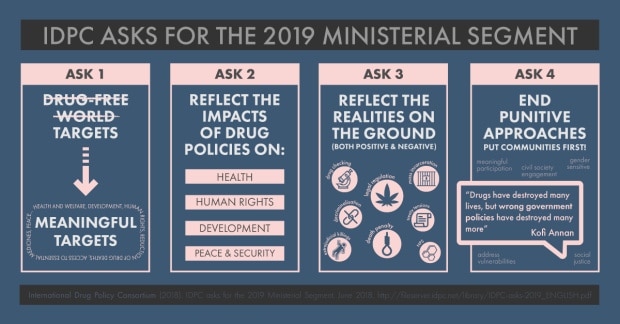The International Drug Policy Consortium, a global network of over 170 NGOs that promotes objective and open debate on drug policy tried—like, really tried—to help United Nations member states understand smart drug policy in anticipation of the Commission on Narcotic Drugs March 2019 Ministerial Segment.
The IDPC released an October 2018 civil society shadow report that spelled out, over 66 pages, the utter failure of drug-war policies.
Yet the Ministerial Segment did not listen, as exemplified by their Declaration’s catchy title: “Draft ministerial declaration on strengthening our actions at the national, regional and international levels to accelerate the implementation of our joint commitments to address and counter the world drug problem.”
Basically, the UN body that reviews international drug policy dug its heels into the worldwide War on Drugs.
The IDPC in turn released a March 14 statement, and here (as interpreted by Filter) are four of the network’s responses:
1. Just Say No to a “drug-free world!”
The Declaration reasserts that the member states are determined “to actively promote a society free of drug abuse in order to help ensure that all people can live in health, dignity and peace.”
But for the IDPC, aiming to eradicate all psychoactive substances is not only infeasible—it is also not futile and unethical.
“This goal is not ‘aspirational’—as would calling for a world free of HIV or poverty,” asserts the IDPC statement. “It is devastating for communities worldwide.”
2. Maybe your drug policies should consider something called “human rights”?
The IDPC recognizes that the Ministerial Declaration does acknowledge member states’ human rights obligations.
But their problem with the Declaration is that it “does not explicitly include a specific target aimed at significantly reducing violations of human rights committed in the name of drug control or combatting impunity in the coming decade is a grave omission.”
Thousands of drug-related executions and extra-judicial killings around the world bear grim testament to this.
3. Your drug policies are so passé.
Cannabis has swept across swathes of North America, the IDPC points out.
Linking the growing tides of criminal justice reform and progressive drug policies, the network calls on the Ministerial Segment to catch up with and consider the practical outcomes of innovative policies enacted on the ground all over the world.
4. Prohibition hurts people—especially those most marginalized in society.
“Ending punitive approaches towards those most vulnerable will require that global drug control going forward puts people and communities at the centre,” asserts the IDPC, “and seeks to improve their living conditions, address their situations of vulnerability and protect their human rights.”
The statement adds one further point, directed at all of us who were not privileged to be involved in the Ministerial Segment:





Show Comments